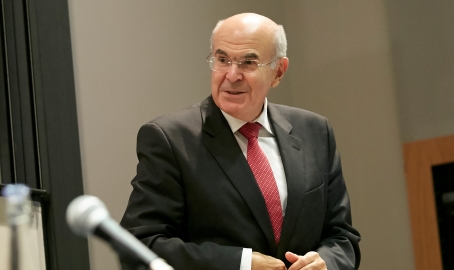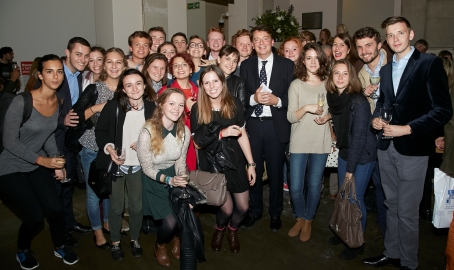'Common law lawyers and their influence on EU Law'

(L-R) Professor Takis Tridimas and Professor Andrea Biondi (Directors of the Centre of European Law); Professor Evelyn Welch (Vice Principal Arts & Sciences); Vassilios Skouris, President of The European Court of Justice; Lord Douro, Chairman of the College Council;Dr Oana Stefan, Senior Lecturer in the Centre of European Law.
His Honour Justice Vassilios Skouris, President of the European Court of Justice, visited The Dickson Poon School of Law on 1 October to deliver the Centre of European Law Annual Lecture. The lecture marked the 40th anniversary of the Centre of European Law and was chaired by the Rt Hon Lord Mance PC. The Rt Hon Lord Douro, Chair of College Council, opened the event.
President Skouris observed that the relationship between the common law tradition, the civil law tradition, and European Union law is a circular one. Relying on the words of Lord Neuberger, he considered that this relationship is one of cross-fertilisation, and advised to look at European law as a synthesis of several legal traditions.
In his carefully worded speech, the President showed how the common law tradition contributed to the development of EU law as a result of three important elements: the preliminary rulings sent by the common law courts, the art of advocacy, and the notion of precedent. In particular, the President praised the high quality of the preliminary references sent by the English courts, and appreciated the fact that UK judges are using this procedure as a tool to enhance fundamental rights protection. Judges enter in a true dialogue with the Court of Justice of the European Union, and the obligations stemming from European judgments are sincerely carried out by the UK.

Vassilios Skouris, President of the European Court of Justice, addresses the audience during the 40th Centre of European Law Annual Lecture.
Justice Skouris warned against the danger of evaluating the Court of Justice of the European Union by reference to experiences with a particular national judiciary. He addressed several concerns that common lawyers have in relation with the procedures and practice of the EU Courts. Among others, the President explained that the judgments issued by the EU Courts have their own concise style, as they need to be understood by judges coming from 28 different legal traditions in order to ensure the uniform application of EU law. He also pointed out that the lack of dissenting opinions entices the majority to seriously consider the concerns of the minority during Court deliberations.
The president concluded by observing that the common law ideal of a perfectly simple legal order has not yet been realised at the EU level; however the vital and ongoing contribution of the common law tradition to the development of European Union law should never be underestimated.

Professor Andrea Biondi with students from The Dickson Poon School of Law.
The Centre of European Law at 40
The Centre of European Law was established on 1 October 1974 when the EU had just nine members. One of the first professors of European Law in the country, Professor Alexandros Chloros, was appointed as its inaugural Director. Professor Choloros left King’s in 1981 to become the first Greek judge in the European Court, following Greece’s entry into the EU.
His successor was Professor Sir Francis Jacobs who combined his academic career with practice as an eminent barrister in European Law – he directed the Centre until 1988 when he was also appointed to the European Court of Justice as Advocate General. Sir Francis still plays an active role as the Centre’s President.
The Centre continues to be at the vanguard of developments in European Law and maintains its reputation as a trusted source of intelligence in European Law. Future plans include the expansion of the distance learning programmes, research funding initiates and a continuous programme of lectures and workshops, which attract an audience of practising lawyers, judges and scholars.
The current Centre of European Law Directors are Professor Andrea Biondi and Professor TakisTridimas.
See photos from the event on the School's Flickr account
Find out more about the Centre of European Law on the Centre’s website.
Listen again on SoundCloud